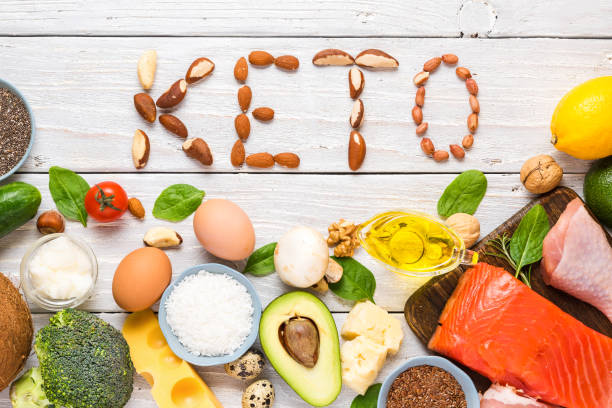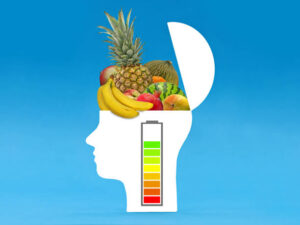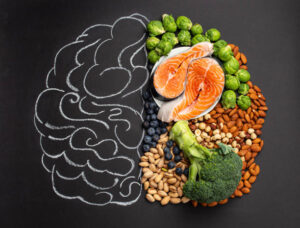Are you looking for an effective, plant-based way to shed those extra pounds while maintaining your ethical and health-conscious lifestyle? A keto vegan diet plan for weight loss might just be what you need. By combining the fat-burning principles of the ketogenic diet with the nutrient-packed goodness of vegan eating, you can achieve your weight loss goals without compromising on values or nutrition.
What is a Keto Vegan Diet?
A keto vegan diet merges two dietary approaches—ketogenic and vegan—to create a unique eating plan that emphasizes health, ethics, and effective weight loss. Let’s break down the core principles of each and understand why combining them is such a powerful choice.
The Ketogenic Diet
The ketogenic diet is a low-carb, high-fat eating approach that aims to push your body into a metabolic state called ketosis. Normally, your body relies on carbohydrates as its primary energy source, breaking them down into glucose. However, when carb intake is drastically reduced (typically below 50 grams per day), the body starts using fat as its main fuel.
In ketosis, your liver converts stored fat into molecules called ketones, which supply energy to your body and brain. This fat-burning mechanism is why the ketogenic diet is often associated with rapid and effective weight loss. It also helps stabilize blood sugar, reduce cravings, and improve focus.
The Vegan Diet
On the other hand, the vegan diet is a plant-based approach that eliminates all animal-derived products, including meat, dairy, eggs, and even honey. It focuses on consuming whole, nutrient-dense plant foods such as fruits, vegetables, legumes, nuts, seeds, and grains.
A vegan diet is celebrated for its numerous health benefits, including reduced risk of chronic diseases like heart disease, diabetes, and certain cancers. Additionally, it supports environmental sustainability and aligns with ethical values related to animal welfare. We have explained the difference between a vegan and a plant-based diet in this article.
Why Keto Vegan Diets Work for Weight Loss
When it comes to weight loss, the keto vegan diet offers a unique and effective approach. By combining two powerful dietary strategies—ketosis and plant-based nutrition—you can enjoy a sustainable path to shedding pounds without sacrificing health or nutrition. Here’s why it works so well for weight loss:
1. The Power of Ketosis: Burning Fat for Fuel
The keto diet is built on the principle of ketosis, a metabolic state where your body switches from using carbohydrates as its primary fuel source to burning fat. Normally, your body relies on glucose (which comes from carbohydrates) for energy. However, when you reduce carb intake significantly, your body begins to burn stored fat for energy instead.
This fat-burning state leads to rapid weight loss because the body becomes highly efficient at using fat for fuel. As fat is burned for energy, the body naturally sheds excess weight, especially the stubborn fat stored in the abdomen, thighs, and hips.
2. Filling, Nutrient-Dense Foods
One of the key reasons the keto vegan diet works so well for weight loss is that it emphasizes foods that are not only low in carbs but also incredibly nutrient-dense. These plant-based foods are packed with vitamins, minerals, and fiber, all of which help you feel full and satisfied while keeping your body nourished.
The high-fiber content of plant foods like leafy greens, cauliflower, and chia seeds helps regulate digestion and maintain satiety for longer periods. This reduces the temptation to snack or overeat, which are common issues when trying to lose weight. The combination of fiber-rich foods and healthy fats means you stay fuller for longer, making it easier to stick to a reduced-calorie diet without feeling deprived.
3. Reducing Cravings with Healthy Fats
When you cut carbs drastically, one of the immediate benefits of the keto diet is the reduction of sugar and carb cravings. Consuming high-quality plant-based fats like avocados, nuts, seeds, and coconut oil helps satisfy your body’s need for energy and keeps you from experiencing hunger pangs that often lead to overeating.
In contrast to high-carb diets that can cause blood sugar spikes and crashes (which lead to hunger), healthy fats provide a steady source of energy throughout the day. This not only supports ketosis but also helps you avoid the energy dips that can trigger cravings for unhealthy snacks.
4. Sustainable Weight Loss Through Balanced Nutrition
Unlike fad diets that promise quick fixes but are unsustainable, the keto vegan diet promotes sustainable weight loss because it emphasizes balance. By focusing on nutrient-dense foods that are both low in carbs and high in healthy fats and proteins, this diet provides long-lasting results.
As you enter ketosis and rely on fat for energy, your body becomes more efficient at burning calories. But this process also helps to regulate your hormones, including insulin—a hormone that plays a key role in fat storage. By stabilizing insulin levels, the keto vegan diet helps prevent the storage of excess fat, leading to more consistent, long-term weight loss.
5. Reduced Inflammation and Improved Metabolism
Both the keto and vegan components of this diet can help reduce inflammation, which can be a major barrier to weight loss. Inflammation can slow metabolism, making it harder for your body to burn fat.
The vegan aspect of the diet provides plenty of antioxidant-rich foods like leafy greens, berries, and cruciferous vegetables that combat oxidative stress and inflammation. Meanwhile, the keto diet focuses on fats that have anti-inflammatory properties, such as omega-3 fatty acids found in chia seeds, flaxseeds, and walnuts. Together, these factors can help support a more efficient metabolism and smoother weight loss.
6. Improved Insulin Sensitivity
One of the most significant benefits of the keto vegan diet for weight loss is its ability to improve insulin sensitivity. Insulin is the hormone responsible for regulating blood sugar levels and fat storage. By following a low-carb, high-fat diet, you reduce the need for large amounts of insulin, and over time, this improves how your body responds to insulin.
Better insulin sensitivity means your body is better at utilizing nutrients for energy and not storing them as fat. This improves your ability to lose weight and maintain that weight loss over time.
7. A Mindful Approach to Eating
The keto vegan diet encourages a more mindful approach to eating. Since you’re focusing on whole, plant-based foods and minimizing processed options, you’re more likely to develop a healthier relationship with food. You’re also likely to notice and enjoy the natural flavors of plant-based fats and fresh vegetables, which can make your meals more satisfying without needing to overeat.
The Science Behind Keto Vegan Weight Loss
Understanding Ketosis
Ketosis occurs when your carb intake is so low that your body begins using fat as its primary energy source. It produces molecules called ketones, which fuel your body efficiently. The result? Fat loss, stable energy levels, and reduced hunger.
Plant-Based Foods: A Weight Loss Powerhouse
Vegan diets are naturally high in fiber, which helps you feel full and supports digestion. Combining this with keto’s fat-burning mechanism creates a synergy that makes weight loss more achievable.
Key Principles of a Keto Vegan Diet Plan
1. Macronutrient Breakdown
A typical keto vegan macronutrient ratio looks like this:
- Fats: 70–75% of your daily intake.
- Protein: 15–20%.
- Carbs: 5–10%.
Tracking these macros is essential to ensure your body enters and stays in ketosis. Use apps or food scales to stay on top of your intake.
2. Carb Sources on a Keto Vegan Diet
Since carbs are kept to a minimum, focus on low-carb options like:
- Non-starchy vegetables: Zucchini, spinach, cauliflower, and broccoli.
- Nuts and seeds: Almonds, flaxseeds, and chia seeds.
- Coconut products: Coconut milk and unsweetened coconut flakes.
3. Protein on Keto Vegan
Finding adequate plant-based protein while keeping carbs low can be tricky but not impossible. Options include:
- Tofu and tempeh (fermented soy products).
- Seitan (made from vital wheat gluten, great for higher protein days).
- Vegan protein powders (look for low-carb options).
4. Healthy Fats Are Your Best Friend
Fats are the cornerstone of the keto vegan diet. Choose sources like:
- Avocado and avocado oil.
- Olive oil for dressings and cooking.
- Nuts and seeds: Almond butter, walnuts, and sunflower seeds.
- Coconut oil for its keto-friendly medium-chain triglycerides (MCTs).
How to Build a Keto Vegan Diet Plan for Weight Loss
Daily Meal Structure
Here’s a suggested daily breakdown to keep you on track:
- Breakfast: High-fat, low-carb meal to fuel your morning.
- Lunch: Fiber-rich vegetables with healthy fats and moderate protein.
- Dinner: Light, nutrient-dense meals to end the day.
- Snacks: Keto-approved, plant-based treats to curb cravings.
Sample Keto Vegan Meal Plan
- Lunch: A large salad with mixed greens, avocado slices, hemp seeds, and a dressing made from olive oil and lemon juice.
- Dinner: Cauliflower rice stir-fry with tofu, broccoli, and a splash of coconut aminos.
- Snacks: A handful of macadamia nuts or kale chips drizzled with nutritional yeast.
Pro Tip: Prep your meals in advance to avoid reaching for non-keto vegan foods when hunger strikes.
Common Challenges and Solutions
Nutrient Deficiencies
While a keto vegan diet is packed with nutrients, it’s important to watch out for deficiencies, especially in:
- Vitamin B12: Found in fortified foods or supplements.
- Iron: Boost absorption by pairing iron-rich foods like spinach with vitamin C-rich foods.
- Omega-3s: Add chia seeds, flaxseeds, or algae-based omega-3 supplements.
Success Tips for Weight Loss on a Keto Vegan Diet
Adopting a keto vegan diet can be incredibly effective to lose weight and improve overall health. However, to make the most of this approach and achieve lasting success, it’s important to implement a few strategies that can boost your results. Here are some tips to help you stay on track and maximize your weight loss journey.
1. Stay Consistent
Consistency is crucial when it comes to following a keto-vegan diet. The ketogenic diet relies on keeping your carbohydrate intake very low to maintain ketosis, the state in which your body burns fat for energy. If you frequently indulge in cheat meals or exceed your carb limit, you risk being kicked out of ketosis, which can slow down your progress and make it harder to achieve your weight loss goals.
2. Incorporate Intermittent Fasting
Intermittent fasting works well with the keto vegan diet because it naturally complements the body’s fat-burning state. By fasting for extended periods, your body depletes its stored glycogen (sugar) and shifts into fat-burning mode, using fat as its primary source of energy. During the fasting period, your body continues to burn fat, while your eating window allows you to consume nutrient-dense, low-carb foods to support overall health.
3. Keep Active
While the keto vegan diet can be effective, combining it with regular physical activity can significantly enhance your results. Exercise helps boost fat burning, improve metabolism, and increase muscle mass, all of which contribute to overall weight loss.
Yoga, strength training, and high-intensity interval training (HIIT) are all excellent choices when paired with a keto-vegan diet. While cardio is great for burning calories, strength training is particularly beneficial because it helps build lean muscle mass. Muscle burns more calories at rest, which can increase your basal metabolic rate (BMR) and support long-term weight loss.
4. Track Your Macros
One of the easiest ways to stay on track with a keto vegan diet is by tracking your macros (macronutrients)—that is, the balance of fats, proteins, and carbohydrates in your meals. On a keto vegan diet, your macronutrient breakdown should typically consist of 70-75% fats, 20-25% protein, and 5-10% carbohydrates.
There are several apps and tools available that can help you log your food and track your daily macros. Keeping an eye on your macronutrient intake ensures that you’re staying within the appropriate range for ketosis and maximizing your fat-burning potential. Tracking also helps prevent you from accidentally exceeding your carb intake or not consuming enough healthy fats to stay in ketosis.
5. Get Enough Sleep
Quality sleep is often overlooked in weight loss journeys, but it plays a major role in weight management and overall health. Lack of sleep can lead to hormonal imbalances, increased hunger, and poor food choices, which can hinder your weight loss efforts.
Getting 7-9 hours of quality sleep every night is crucial for managing hunger hormones like ghrelin (which triggers hunger) and leptin (which signals satiety). When you’re well-rested, your body is more likely to make healthier food choices, and you’ll have the energy to stay active throughout the day. Plus, sleep is essential for muscle recovery, especially if you’re incorporating exercise into your routine.
6. Hydrate Properly
When transitioning to a keto diet, it’s essential to stay well-hydrated. As your body shifts into ketosis and starts burning fat, it also sheds water, which can lead to dehydration if you’re not mindful.
Drink plenty of water throughout the day, and consider adding electrolytes to your hydration routine. Sodium, potassium, and magnesium are important on a keto vegan diet, as they help maintain proper fluid balance and prevent the “keto flu” symptoms like headaches and fatigue. You can get electrolytes from food sources like leafy greens, avocados, and coconut water, or by using electrolyte supplements.
Is the Keto Vegan Diet Right for You?
The keto vegan diet offers numerous benefits for many individuals, but it’s important to recognize that it isn’t the perfect fit for everyone. While this diet can help with sustainable weight loss, boost energy, and support a healthier lifestyle, it requires careful planning and commitment. Here are some key factors to consider before deciding if the keto vegan diet is right for you:
Want to Lose Weight Sustainably While Staying Plant-Based
The keto vegan diet is a great choice for those committed to losing weight without compromising their plant-based lifestyle. For individuals who are already vegan and want to take advantage of the fat-burning potential of the ketogenic diet, combining the two can offer an effective approach to weight loss.
Unlike conventional low-carb diets that may incorporate animal products, the keto vegan diet emphasizes nutrient-dense plant-based fats, such as avocados, coconut oil, and nuts, while keeping carbohydrates to a minimum. If you’ve tried other weight loss methods that don’t align with your vegan values or didn’t give you the results you were hoping for, the keto vegan diet might be a solution that works in harmony with your ethics and health goals.
Are Committed to Monitoring Your Macros and Making Intentional Food Choices
A key component of the keto vegan diet is managing your macronutrient intake—especially since you’ll be consuming a high amount of healthy fats and significantly limiting carbs. If you’re the kind of person who enjoys planning, tracking, and making intentional food choices, the keto vegan diet could be a good fit for you.
If you’re someone who enjoys learning about nutrition and is comfortable being intentional with food choices, this process of monitoring and adjusting your macros can become a rewarding and empowering part of your weight loss journey. However, it’s important to note that it may not be the best fit for those who prefer a more flexible, less structured approach to eating.
Always Consult with a Healthcare Provider or Dietitian
Before diving into a diet as specific as the keto vegan diet, it’s always recommended to consult with a healthcare provider or a registered dietitian—especially if you have existing health concerns or dietary restrictions. The keto vegan diet, while beneficial for many, can be restrictive, and it’s essential to ensure that it will meet your individual needs.
A healthcare provider can help assess whether this diet is suitable for you based on your unique health profile, medical history, and nutritional needs. For example, if you have a history of kidney disease, hypoglycemia, or gastrointestinal issues, the keto vegan diet may require special modifications.
Conclusion: Keto Vegan Diet for Weight Loss
A keto vegan diet plan for weight loss offers a powerful combination of fat-burning and plant-based goodness. By sticking to the principles outlined here, you can achieve your weight loss goals without sacrificing health or ethics. And science has proven that vegans are right! Start small, focus on balance, and celebrate your progress.
FAQs
Q: Can I lose weight quickly on a keto vegan diet for weight loss?
A: Weight loss rates vary, but many people notice changes within the first few weeks due to fat burning and reduced water retention.
Q: What are the best keto vegan snacks?
A: Nuts, seeds, coconut fat bombs, and kale chips are excellent choices.
Q: Is the keto vegan diet sustainable long-term?
A: Yes, with proper planning and supplementation, a keto vegan diet for weight loss can be sustainable and effective for the long haul.
- Breakfast: Chia seed pudding with unsweetened almond milk, topped with walnuts and a sprinkle of cinnamon.
- Lunch: A large salad with mixed greens, avocado slices, hemp seeds, and a dressing made from olive oil and lemon juice.
- Dinner: Cauliflower rice stir-fry with tofu, broccoli, and a splash of coconut aminos.
- Snacks: A handful of macadamia nuts or kale chips drizzled with nutritional yeast.
Pro Tip: Prep your meals in advance to avoid reaching for non-keto vegan foods when hunger strikes.
Common Challenges and Solutions
Nutrient Deficiencies
While a keto vegan diet is packed with nutrients, it’s important to watch out for deficiencies, especially in:
- Vitamin B12: Found in fortified foods or supplements.
- Iron: Boost absorption by pairing iron-rich foods like spinach with vitamin C-rich foods.
- Omega-3s: Add chia seeds, flaxseeds, or algae-based omega-3 supplements.
Success Tips for Weight Loss on a Keto Vegan Diet
Adopting a keto vegan diet can be incredibly effective to lose weight and improve overall health. However, to make the most of this approach and achieve lasting success, it’s important to implement a few strategies that can boost your results. Here are some tips to help you stay on track and maximize your weight loss journey.
1. Stay Consistent
Consistency is crucial when it comes to following a keto-vegan diet. The ketogenic diet relies on keeping your carbohydrate intake very low to maintain ketosis, the state in which your body burns fat for energy. If you frequently indulge in cheat meals or exceed your carb limit, you risk being kicked out of ketosis, which can slow down your progress and make it harder to achieve your weight loss goals.
2. Incorporate Intermittent Fasting
Intermittent fasting works well with the keto vegan diet because it naturally complements the body’s fat-burning state. By fasting for extended periods, your body depletes its stored glycogen (sugar) and shifts into fat-burning mode, using fat as its primary source of energy. During the fasting period, your body continues to burn fat, while your eating window allows you to consume nutrient-dense, low-carb foods to support overall health.
3. Keep Active
While the keto vegan diet can be effective, combining it with regular physical activity can significantly enhance your results. Exercise helps boost fat burning, improve metabolism, and increase muscle mass, all of which contribute to overall weight loss.
Yoga, strength training, and high-intensity interval training (HIIT) are all excellent choices when paired with a keto-vegan diet. While cardio is great for burning calories, strength training is particularly beneficial because it helps build lean muscle mass. Muscle burns more calories at rest, which can increase your basal metabolic rate (BMR) and support long-term weight loss.
4. Track Your Macros
One of the easiest ways to stay on track with a keto vegan diet is by tracking your macros (macronutrients)—that is, the balance of fats, proteins, and carbohydrates in your meals. On a keto vegan diet, your macronutrient breakdown should typically consist of 70-75% fats, 20-25% protein, and 5-10% carbohydrates.
There are several apps and tools available that can help you log your food and track your daily macros. Keeping an eye on your macronutrient intake ensures that you’re staying within the appropriate range for ketosis and maximizing your fat-burning potential. Tracking also helps prevent you from accidentally exceeding your carb intake or not consuming enough healthy fats to stay in ketosis.
5. Get Enough Sleep
Quality sleep is often overlooked in weight loss journeys, but it plays a major role in weight management and overall health. Lack of sleep can lead to hormonal imbalances, increased hunger, and poor food choices, which can hinder your weight loss efforts.
Getting 7-9 hours of quality sleep every night is crucial for managing hunger hormones like ghrelin (which triggers hunger) and leptin (which signals satiety). When you’re well-rested, your body is more likely to make healthier food choices, and you’ll have the energy to stay active throughout the day. Plus, sleep is essential for muscle recovery, especially if you’re incorporating exercise into your routine.
6. Hydrate Properly
When transitioning to a keto diet, it’s essential to stay well-hydrated. As your body shifts into ketosis and starts burning fat, it also sheds water, which can lead to dehydration if you’re not mindful.
Drink plenty of water throughout the day, and consider adding electrolytes to your hydration routine. Sodium, potassium, and magnesium are important on a keto vegan diet, as they help maintain proper fluid balance and prevent the “keto flu” symptoms like headaches and fatigue. You can get electrolytes from food sources like leafy greens, avocados, and coconut water, or by using electrolyte supplements.
Is the Keto Vegan Diet Right for You?
The keto vegan diet offers numerous benefits for many individuals, but it’s important to recognize that it isn’t the perfect fit for everyone. While this diet can help with sustainable weight loss, boost energy, and support a healthier lifestyle, it requires careful planning and commitment. Here are some key factors to consider before deciding if the keto vegan diet is right for you:
Want to Lose Weight Sustainably While Staying Plant-Based
The keto vegan diet is a great choice for those committed to losing weight without compromising their plant-based lifestyle. For individuals who are already vegan and want to take advantage of the fat-burning potential of the ketogenic diet, combining the two can offer an effective approach to weight loss.
Unlike conventional low-carb diets that may incorporate animal products, the keto vegan diet emphasizes nutrient-dense plant-based fats, such as avocados, coconut oil, and nuts, while keeping carbohydrates to a minimum. If you’ve tried other weight loss methods that don’t align with your vegan values or didn’t give you the results you were hoping for, the keto vegan diet might be a solution that works in harmony with your ethics and health goals.
Are Committed to Monitoring Your Macros and Making Intentional Food Choices
A key component of the keto vegan diet is managing your macronutrient intake—especially since you’ll be consuming a high amount of healthy fats and significantly limiting carbs. If you’re the kind of person who enjoys planning, tracking, and making intentional food choices, the keto vegan diet could be a good fit for you.
If you’re someone who enjoys learning about nutrition and is comfortable being intentional with food choices, this process of monitoring and adjusting your macros can become a rewarding and empowering part of your weight loss journey. However, it’s important to note that it may not be the best fit for those who prefer a more flexible, less structured approach to eating.
Always Consult with a Healthcare Provider or Dietitian
Before diving into a diet as specific as the keto vegan diet, it’s always recommended to consult with a healthcare provider or a registered dietitian—especially if you have existing health concerns or dietary restrictions. The keto vegan diet, while beneficial for many, can be restrictive, and it’s essential to ensure that it will meet your individual needs.
A healthcare provider can help assess whether this diet is suitable for you based on your unique health profile, medical history, and nutritional needs. For example, if you have a history of kidney disease, hypoglycemia, or gastrointestinal issues, the keto vegan diet may require special modifications.
Conclusion: Keto Vegan Diet for Weight Loss
A keto vegan diet plan for weight loss offers a powerful combination of fat-burning and plant-based goodness. By sticking to the principles outlined here, you can achieve your weight loss goals without sacrificing health or ethics. And science has proven that vegans are right! Start small, focus on balance, and celebrate your progress.
FAQs
Q: Can I lose weight quickly on a keto vegan diet for weight loss?
A: Weight loss rates vary, but many people notice changes within the first few weeks due to fat burning and reduced water retention.
Q: What are the best keto vegan snacks?
A: Nuts, seeds, coconut fat bombs, and kale chips are excellent choices.
Q: Is the keto vegan diet sustainable long-term?
A: Yes, with proper planning and supplementation, a keto vegan diet for weight loss can be sustainable and effective for the long haul.







